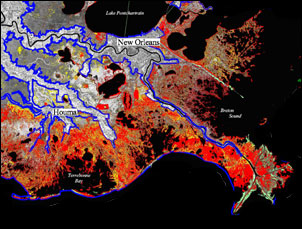
The 404 Reports
Summaries of under-reported news, updates on previous Monitor stories
| The 404 Reports Summaries of under-reported news, updates on previous Monitor stories |
|
[Editor's note: Do not bookmark this page, as the 404 Reports address will change with each edition.] |
|
|
|
|

|
|
|
...The Bush administration's policy of turning over wetlands to developers almost certainly also contributed to the heightened level of the storm surge. In 1990, a federal task force began restoring lost wetlands surrounding New Orleans. Every two miles of wetland between the Crescent City and the Gulf reduces a surge by half a foot. Bush had promised "no net loss" of wetlands, a policy launched by his father's administration and bolstered by President Clinton. But he reversed his approach in 2003, unleashing the developers.
Probably by coincidence, Molly Ivins wrote much the same thing in her column about Hurricane Katrina published the same day. "It is a fact that the Clinton administration set some tough policies on wetlands, and it is a fact that the Bush administration repealed those policies -- ordering federal agencies to stop protecting as many as 20 million acres of wetlands," she wrote. "...Bush administration's policies had allowed developers to drain thousands of acres of wetlands."
But in this one instance, Bush is getting a bad rap; as experts from three Gulf wetlands restoration groups told MONITOR this week, there's been no rampant development in the areas in question, because of Bush policies or no. The only construction anyone could think of that might have somewhat worsened flooding was in shorline Lake Pontchartrain communities such as Slidell.
You can certainly charge Bush with neglect of the Louisiana wetlands, but the damage there was caused by ongoing abuse, particularly short-sighted "improvements" to the waterways for navigation. The other major cause of the loss of Louisiana's wetlands has been the result of oil and gas extraction activities. "The energy industry has placed pipelines and dug channels through the marsh to convey oil and gas to its processors and transporters," explained Susan Kaderka, Director of the Gulf States Natural Resource Center for the National Wildlife Federation. "These channels have allowed salt water from the Gulf to intrude into freshwater marsh areas, killing off vegetation that is not used to salt water. As the vegetation dies, the soil it was holding in place just slips away, and what was once a continuous marsh becomes a sort of swiss cheese pattern, with large areas of open water."
It's important to note that Blumenthal, Ivins, and others that have since mentioned Bush's damage to wetlands are also fundamentally correct, when it comes to the rest of the country. Changes in 2003 to the Clean Water Act eliminated the need for permits when wetlands are destroyed or polluted, as long as the area is within a single state and not part of a navigable waterway. That almost all Louisiana wetlands are connected to lakes, rivers, or the Gulf spared them from the loophole.
Bush has also perverted the Conservation Reserve Program into a giveaway for big agribusiness. The original CRP, which began in 1985, became a major conservation program that reversed the loss of wetlands. It now includes 800,000 more acres of grassland, border farmland, and non-floodplain wetlands. And here's the ugly catch: Those lands will also be exempt from any environmental protection. This might allow a slaughterhouse, for example, to not only dump animal waste in a seasonal wetland (Bush calls 'em "Prairie Potholes") without worry of government penalty, but also be paid about $60/acre for the pleasure.
In other times, other places, debating whether a two year-old policy change led to environmental damage significant enough to affect the flooding of New Orleans would be a quibble. But in year 5 of Era Bush, we know how the game works; FOX and the gaggle of spinners will use any flaw to discredit voices of the opposition, like tugging on a sweater's thread until the whole thing unravels. Before we know it, attention could be diverted away from Bush's very real complicity in the underlying causes of the tragedy and we might find ourselves plunged into a national debate about building permits in southern Louisiana parishes, or some other mordant distraction. Anyone who doubts that the Bush troops would twist an issue as important as the New Orleans flood should have a sit-down with John Kerry, or any of the other victims flattened by their steamroller. (September 11, 2005)
Albion Monitor Issue 138 (http://www.albionmonitor.com)
All Rights Reserved.
Contact rights@monitor.net for permission to use in any format.